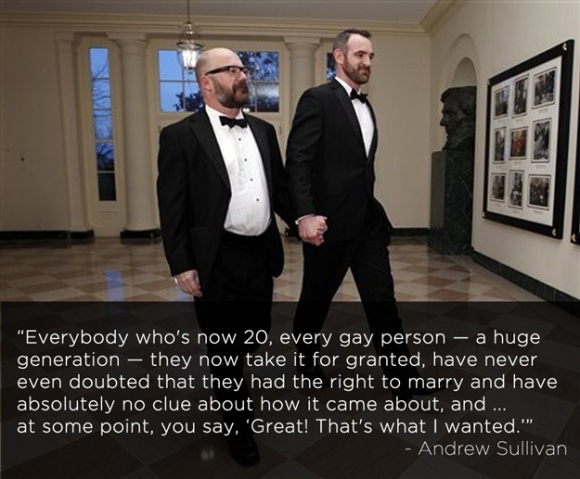Andrew Sullivan reflects on his road to gay marriage ... and ours
From today's Daily Dish:

This graph tells the story:

This pattern in the US goes along with the broad tendencies in a lot of other western societies. That's an astoundingly rapid change in cultural norms and ideology within such a short time. And it's part of a larger process by which active bigotry and discrimination against homosexuals and pervasive demonization of homosexuality, which were not just widespread but routine and taken-for-granted not so long ago, have become much less accepted and respectable. In fact, for significant proportions of people under 30, homophobic bigotry and the persecution of gays and lesbians have increasingly come to seem, not just wrong, but baffling and pointless—which is one more reason why these trends may well prove to be self-reinforcing in the future. (Even though one should always be careful about simply projecting unilinear trends into the future, since actual history is full of reversals and backlashes.) Again, all of this would have seemed inconceivable a generation ago. It's almost enough to make on believe in the possibility of moral progress.
—Jeff Weintraub

Here’s Chris Geidner’s profile of Evan Wolfson and me – who were once the only two gay activists of our generation who, despite core philosophical differences, made the once ludicrous idea of gay marriage the cause of our lives. It was a thrilling time in a way – because it seemed simply impossible, yet to us, utterly irrefutable as a logical and legal argument. We used to joke, as we toured the country, went on every cable show, spoke on campus after campus, agreed to talk-radio grillings, and wrote essays and legal briefs and books and strategy sessions, how funny it was we were so busy fighting for marriage that we didn’t have time to have a boyfriend.A generation ago, the legalization of same-sex marriage did indeed seem like an absurd utopian fantasy, more appropriate for sociological science fiction than for serious political discussion. Now, unless there is some dramatic reversal of the long-term trends in public opinion, the general acceptance and institutionalization of a right to same-sex marriage is probably just a matter of time.
And then the big surprise. We both became the victims of our own arguments [....]
This graph tells the story:

This pattern in the US goes along with the broad tendencies in a lot of other western societies. That's an astoundingly rapid change in cultural norms and ideology within such a short time. And it's part of a larger process by which active bigotry and discrimination against homosexuals and pervasive demonization of homosexuality, which were not just widespread but routine and taken-for-granted not so long ago, have become much less accepted and respectable. In fact, for significant proportions of people under 30, homophobic bigotry and the persecution of gays and lesbians have increasingly come to seem, not just wrong, but baffling and pointless—which is one more reason why these trends may well prove to be self-reinforcing in the future. (Even though one should always be careful about simply projecting unilinear trends into the future, since actual history is full of reversals and backlashes.) Again, all of this would have seemed inconceivable a generation ago. It's almost enough to make on believe in the possibility of moral progress.
—Jeff Weintraub


<< Home